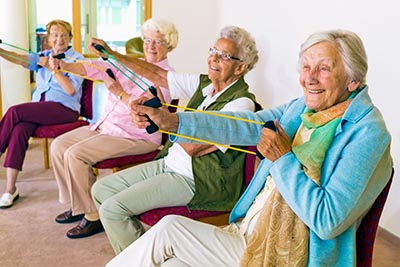 In 2006 – 2008, the City of Los Angeles Department of Aging, in partnership with Oasis, collaborated with 11 local senior centers in the city of Los Angeles in a study to assess the effectiveness of Active Start, a community-based behavior change and fitness program, designed to promote physical activity among sedentary community-dwelling adults aged 50 and older. Active Start combined two 20-week evidence-based programs, Active Living Every Day (ALED) and ExerStart. ALED was developed to promote the adoption and maintenance of physical activity in adults. It is based on groundbreaking research conducted at The Cooper Institute that found that physical activity need not be strenuous or time-consuming to benefit health and adults are more likely to become and stay physically active when taught appropriate lifestyle skills. These skills include identifying and overcoming barriers to physical activity, learning to incorporate physical activity into a busy schedule, increasing self-confidence, building social support, setting realistic goals, and staying motivated. ExerStart is a low-intensity program designed specifically for sedentary older adults. It is comprised of 43 exercises focusing on aerobic strength, flexibility, and balance. Active Start was designed to change physical activity behaviors among predominately sedentary and racially – ethnically diverse community-dwelling older adults. The intervention targeted those who were sedentary or underactive, with physical activity levels less than recommended moderate physical activity. Participants of this study were recruited from community senior centers and senior housing facilities in the city of Los Angeles. Active Start also recruited peer lay leaders to motivate and train participants. The lay leader approach was piloted and subsequently implemented in Active Start in response to participant feedback that the fitness professionals did not understand and share daily challenges. Active Start was conducted for 24 weeks; the first four weeks were ALED only, followed by 16 weeks of the combined ALED and ExerStart programs; the last four weeks were ExerStart only.
In 2006 – 2008, the City of Los Angeles Department of Aging, in partnership with Oasis, collaborated with 11 local senior centers in the city of Los Angeles in a study to assess the effectiveness of Active Start, a community-based behavior change and fitness program, designed to promote physical activity among sedentary community-dwelling adults aged 50 and older. Active Start combined two 20-week evidence-based programs, Active Living Every Day (ALED) and ExerStart. ALED was developed to promote the adoption and maintenance of physical activity in adults. It is based on groundbreaking research conducted at The Cooper Institute that found that physical activity need not be strenuous or time-consuming to benefit health and adults are more likely to become and stay physically active when taught appropriate lifestyle skills. These skills include identifying and overcoming barriers to physical activity, learning to incorporate physical activity into a busy schedule, increasing self-confidence, building social support, setting realistic goals, and staying motivated. ExerStart is a low-intensity program designed specifically for sedentary older adults. It is comprised of 43 exercises focusing on aerobic strength, flexibility, and balance. Active Start was designed to change physical activity behaviors among predominately sedentary and racially – ethnically diverse community-dwelling older adults. The intervention targeted those who were sedentary or underactive, with physical activity levels less than recommended moderate physical activity. Participants of this study were recruited from community senior centers and senior housing facilities in the city of Los Angeles. Active Start also recruited peer lay leaders to motivate and train participants. The lay leader approach was piloted and subsequently implemented in Active Start in response to participant feedback that the fitness professionals did not understand and share daily challenges. Active Start was conducted for 24 weeks; the first four weeks were ALED only, followed by 16 weeks of the combined ALED and ExerStart programs; the last four weeks were ExerStart only.
Significant improvement was found on all performance measures (strength, flexibility, and balance) for the intervention group as a whole. Similar improvements were found among subgroups (Whites, African Americans, and Hispanics). When the intervention group had completed the intervention, participants in the waitlist comparison group were invited to begin the intervention. This study suggested that a community-based physical activity program benefits sedentary, racially, and ethnically diverse older adults by coupling a behavioral change support group and fitness classes (The Gerontologist Vol. 49, No. 6, 847–855).

Leave A Comment